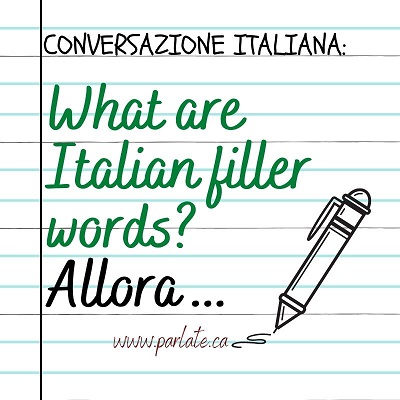In italiano le ‘parole riempitive’ o ‘intercalari’ si usano in abbondanza, come potrai notare dalla lunga lista che ho compilato. Si possono dividere in 3 catogorie: iniziatori, mediani e finalizzatori. Anche se, diciamo che, alcune di queste parole o espressioni si prestano bene in diverse situazioni. Sono particolarmente importanti per dare fluidità ad una conversazione. Comunque se non sei un madrelingua “allora diciamo che magari ti danno tutto sommato” più tempo per formulare i tuoi pensieri in italiano. Ecco alcune delle più comuni ‘parole riempitive’ o ‘intercalari’ della lingua italiana.
In Italian the ‘filler words’, “parole riempitive” o”intercalari” are used in abundance, as you can see from the long list I have compiled. They can be divided into 3 categories: starter words, middle words and ending words. Although, “diciamo”, let’s say that, some of these words or expressions lend themselves well in different situations. They are particularly important for giving fluidity to a conversation. However, if you are not a native speaker “then let’s say that maybe they give you all in all” (“allora diciamo che magari ti danno tutto sommato”) more time to formulate your thoughts in Italian. Here are some of the most common ‘filler words’ of the Italian language.
Iniziatori – Starter words
Sono molto utili per iniziare una frase o per darti tempo per organizzare i pensieri. Si può iniziare con anche più di uno….”mah, senti, allora….dunque.”
They are very useful for starting a sentence or giving you time to organize your thoughts. You can start with more than one …. ”mah, senti, allora….dunque.”
Allora (so)
Senti (hear me out)
Sai (you know)
Mah (indicates doubt, disappointment)
Guarda (look)
Dunque (so)
Onestamente (honestly)
Praticamente (practically)
Sostanzialmente (essentially)
Bene (great/well)
Vabbe (whatever)
Beh (well)
Fammi pensare (let me think)
Ehm (um)
Mica (perhaps)
Niente (anyway)
Esempio/ Example:
-Allora, che ne dici di andare al cinema stasera?
– Mah, onestamente, preferirei una pizza.
– Sai, possiamo mangiare la pizza prima e poi guardare il film.
– Ehm, fammi pensare…d’accordo. Ci sto!
-So, what about going to the cinema tonight?
– … honestly, I’d prefer a pizza.
– You know, we could eat the pizza first and then watch the film.
– Um, let me think … okay. I’m in!
Mediani – Middle Words
A volte mentre parli la parola giusta non ti viene immediatamente, allora per sbloccarti puoi usare queste parole riempitive :
Sometimes while you are speaking, the right word does not immediately come to mind, so to get unstuck you can use these filler words:
Che dire (what can I say)
Cioè (in other words)
Niente (anyway)
Capito (got it?)
Sai (you know)
Mah (indicates doubt, disappointment)
Onestamente (honestly)
Praticamente (practically)
Sostanzialmente (essentially)
Comunque (however)
Diciamo (let’s say)
Boh (I don’t know)
Ehm (um)
Insomma (in short)
Nel senso (I mean)
Per intenderci (to understand eachother)
Non so (I don’t know)
Tutto sommato (after all)
Che so io (what do I know)
Magari (perhaps)
Mica (perhaps
Tipo (like)
Esempio/ Example:
Sono andata alle poste ed era praticamente pieno di gente, insomma zeppo…tipo non ci si riusciva a muovere, boh, che dire, me ne sono tornata a casa.
I went to the post office and it was practically full of people, in short, packed … like we could’t move, I don’t know, what can I say, I went home.
Finalizzatori – Ending words
Per indicare che abbiamo finito di parlare usiamo i finalizzatori:
To indicate that we have finished speaking we use finalizers:
E quant’altro (and so on)
E niente (anyway)
Capito (got it?)
Mah (indicates doubt, disappointment)
Bene (great)
Vabbe/beh
Che dire (what can I say)
Diciamo (let’s say)
Boh (I don’t know)
Insomma (in short)
In conclusione (in conclusion)
Per intenderci (to understand eachother)
Purtroppo (unfortuntaley)
Esempio/ Example:
…E niente, la fila per il ristorante era lunga e ci hanno detto di pazientare ancora per 30 minuti, capito…
… Anyway, the line-up for the restaurant was long and we were told to wait another 30 minutes, got it…?
Insomma, che dire, in italiano, practicamente la varietà di espressioni non manca! (In short, what can I say, practically there’s no shortage of filler words!)
Scrivi una frase nei commenti con i tuoi intercalari preferiti. / Write a sentence in the comments with your favorite filler words.
- Il Discorso diretto e discorso indiretto in italiano

- I massacri delle foibe – Il Giorno del Ricordo

- Un racconto di Natale: Il Tesoro dei Poveri di Gabriele D’Annunzio

- Estate di San Martino- leggenda e tradizioni

- I verbi fraseologici: venire/andare a prendere

- Michela Murgia: tenace scrittrice e attivista italiana

- I Vini italiani |Storia e Cultura

- Come diventare migliori comunicatori in italiano

- 3 ways to pronounce the s in Italian


